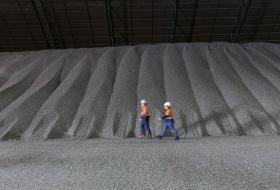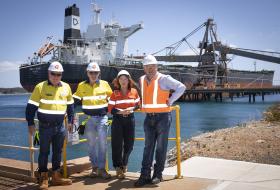Port of Esperance welcomes new iron ore trade
-
Esperance
-
Corporate
- Published: 12 June 2024

Southern Ports is set to welcome a new iron ore exporter in a deal that will boost iron ore trade by up to 1.5 million tonnes each year through the Port of Esperance.
In a new agreement announced by Minister for Ports Hon David Michael MLA, Southern Ports will grant Gold Valley Iron Ore access to critical iron ore infrastructure at the Port of Esperance, including rail receival facilities, conveyors, shed space and the ship loader.
“Opening up Port of Esperance infrastructure to a second exporter will see iron ore trade capacity maximised, resulting in a positive boost to the Western Australian economy." said Minister Michael.
“I am pleased to see the use of the rail system for this trade, which would otherwise be trucked by road to the Port of Geraldton."
Southern Ports Chief Executive Officer Keith Wilks celebrated the new deal which is a first in the history of the Port of Esperance.
“We’re pleased to welcome Gold Valley Iron Ore into our Port of Esperance,” said Mr. Wilks.
“This new trade deal will secure additional iron ore exports through Esperance, which will have additional economic benefits for our region, but also marks a significant milestone for our iron ore circuit.”
This is the first time a second customer has been able to access the iron ore circuit through the Port and the first from the Wiluna area. Longstanding customer Mineral Resources Ltd will continue to export through the shared infrastructure at the port.
Gold Valley Iron Ore is expected to export its first shipment from the Port of Esperance from September 2024.
Agricultural Region MLC Shelley Payne said the Port of Esperance is a vital cog in the regional economy.
“This is a huge win for the local community and the wider Goldfields-Esperance region.”
Iron ore continues to be the Port of Esperance’s most exported commodity, with more than 7.6 million tonnes last year and almost 37 million tonnes from 2018 to 2023.
For more information the Minister for Ports’ full statement is available here.


